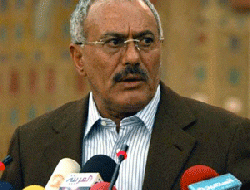A group representing Yemeni Americans demanded on Wednesday the prosecution of outgoing President Ali Abdullah Saleh and the freezing of his assets as the dictator flies to the U.S. for treatment.
“(The Yemeni-American community) stands completely with the legitimate demands of the Yemeni people: to prosecute Saleh for war crimes and human rights abuses, and to hold free and fair elections with more than just one candidate served up by the current regime,” the Yemeni American Coalition for Change (YACC) said in a statement.

|
| President Ali Abdullah Saleh |
The coalition, comprised of activists, professionals, students, teachers and concerned Yemeni-Americans, expressed “outrage” over the Gulf Cooperation Council’s agreement deal granting the outgoing president full immunity for his crimes against protesters and civilians.
“This agreement was devised without any input from the Yemeni opposition and is purely the product of neighboring governments,” the statement read.
Hundreds of protesters are said to have been killed during a brutal crackdown on a mass pro-democracy uprising last year that eventually forced Saleh to cede power.
The YACC also expressed “disappointment” at the decision made by the U.S. to grant President Ali Abdullah Saleh refuge in the country.
“It is with great disappointment that the Yemeni-American community and its supporters received the news of President Ali Abdullah Saleh’s impending arrival to the United States,” the statement read.
The coalition stated that it was “perplexed” by the decision to grant Saleh haven, even if it is temporary.
The U.S. backed the Gulf initiative to oust Saleh from power, despite it also allowing the dictator to maintain his wealth.
The YACC wants Saleh’s assets frozen, pointing to years of corruption that has profited the dictator and his regime, while the Yemeni population suffers in poverty.
“In his 33 years of rule, Saleh’s regime has plundered money from the Arab World’s poorest nation,” the coalition added.
The statement also mentioned that Saleh and members of his regime skimmed almost $2 billion a year for private gain over the three decades of his rule. Estimates for the holdings of Saleh and his family exceed billions, much of it held overseas.
“We are therefore calling for the freezing of his assets and demanding that he return all stolen monies to the impoverished nation,” YACC wrote.
Meanwhile, Al-Qaeda linked gunmen on Wednesday reportedly pulled out of the central town of Radda which they held for nine days, tribal leaders and witnesses said.
A senior military official said there had been mediation to convince the armed extremists to withdraw from Radda, 80 miles southeast of the capital Sanaa.
“Tribal mediation carried out by Sheikh Hashed Fadhl al-Qawsi succeeded, after three days of talks, to convince the armed Al-Qaeda men to leave Rada,” the military official said late on Tuesday.
The tribal mediators, who have formed a committee of 35 dignitaries from seven different Yemeni cities, said they warned the militants that if they do not pull out from the town, they would be forced out.
Tribes, who are usually heavily armed, still play a vital role in Yemen’s politics and society.
Residents of Radda took to the streets in celebration and fired shots in the air as news of Al-Qaeda’s withdrawal spread.
“Life in Radda is returning to normal and residents have begun removing rocks” used by the militants to block roads, said resident Aref al-Amri. He added that shops were reopening.
Residents also paraded in the town carrying banners reading “the farce is over.”
Tribal mediators had convinced the militants to leave the town in return for the release of 15 of their members held by Yemeni authorities without trial, according to local dignitary, Ahmad Kalaz.
Some of the prisoners have already been released, one of the mediators said without giving further details. The rest would be released over the next two days.
Among the prisoners to be set free is Nabil al-Dahab, brother of prominent Al-Qaeda leader Tarek al-Dahab.
Al-Qaeda-linked militants control a string of towns in Abyan, Shabwa and Marib provinces across the south and east, but Radda, in Al-Bayda province, is the closest they got to the capital.
The militants overran Radda within hours on January 16, marking a significant advance by the extremists towards the capital.
Opponents of Saleh accuse him of deliberately handing over towns and cities across the country to armed extremists in an attempt to gain Western support for his regime.
Saleh was a key U.S. and Saudi ally in his fight against al-Qaeda linked militants in the south of the country.
— TAAN, Al-Akhbar






Leave a Reply